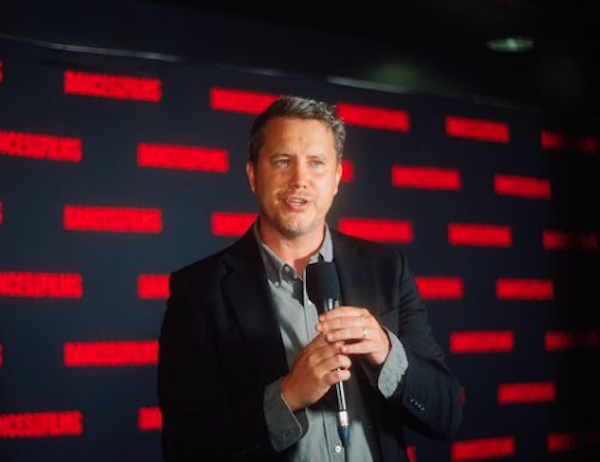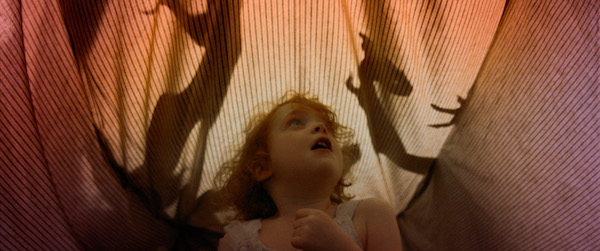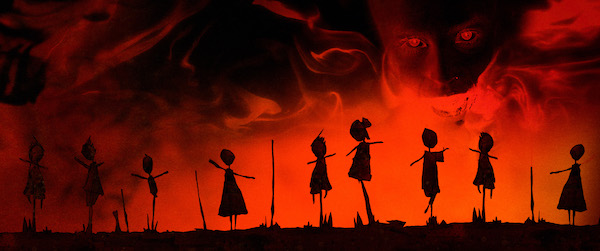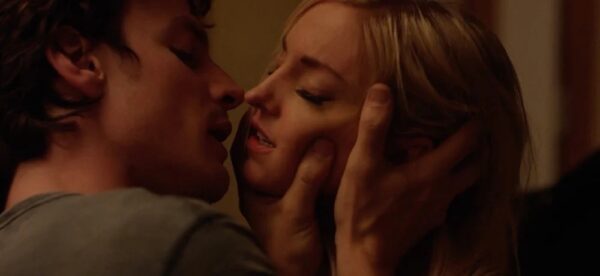Film Interview: Director Ryan Stevens Harris on Cultivating a “Moon Garden”
By Nicole Veneto
Director Ryan Stevens Harris talks about his stunningly cinematic home-grown labor of love, Moon Garden.
Moon Garden is currently screening in New York and is scheduled for runs in other US cities. New England dates have not yet been announced at this time. The film received the “Audience Award” at this year’s Boston Underground Film Festival despite some formidable competition from higher-profile releases like Enys Men and How to Blow Up a Pipeline. Moon Garden is director Ryan Stevens Harris’s first feature and stars his own daughter, Haven Lee, as Emma, a young girl who falls into a coma and must traverse a magical industrial wonderland in order to make her way back to the waking world, aided only by a radio transistor broadcasting her troubled parents’ voices from her hospital bedside. By day, Harris is an editor whose credits include Roland Emmerich’s Moonfall.
As the film premieres in New York and Los Angeles (on May 26), Harris called in all the way from Rome to discuss his stunningly home-grown labor of love with the Arts Fuse, which had plenty of questions about this “emotionally devastating and beautiful descent into a young girl’s imagination.”

Moon Garden director Ryan Stevens Harris. Photo: courtesy of the artist
Arts Fuse: Moon Garden operates on an incredibly intimate and emotional level, so I’m curious if the film came about through any of your own personal experiences growing up?
Ryan Stevens Harris: Well, it’s so hard because I don’t wanna like … throw anybody under the bus. I come from a very supportive family, but, you know, we’re very — what’s the best way to put it? Mercurial or volatile? Love my family to death though! [In the relationship in the film] there’s no real clear villains. It was very important to make it initially seem like maybe the dad [played by Brionne Davis] is too aggressive and the mom [played by Augie Duke] is breaking down, but then hopefully you learn later that the mom is having her own issues and the dad is trying to hold everything together. Then, at the end, the little girl [played by Harris’s own daughter Haven Lee] sees things in a way that brings everybody together. She can see magic in even the most mundane things.
AF: Were there any films, books, or particular pieces of art that inspired the look of the industrial dreamscape featured in the film? I and a lot of other critics have cited Phil Tippett’s Mad God and Guillermo del Toro’s Pan’s Labyrinth when describing the look and feel of Moon Garden, but I also noted the influence of Jan Švankmajer’s Alice and Tarsem Singh’s The Fall as well.
RSH: It’s hard to unpack influences. You mentioned Švankmajer and people have mentioned Alice in terms of the little girl’s vulnerability. I was always thinking of Švankmajer’s Alice because some people were worried about a young girl having to carry the movie. Believe it or not, Return to Oz is also a film I had in mind, which is a tough sell because it was such a box office killer. But Return to Oz has all these really twisted scenes which seem too dark for a little kid to watch, and they scarred my brain in such a good way. Along those same lines there’s a weird animated movie called Dot and the Kangaroo that has a sequence with [a character named] Bunyip that I was horrified by. He was born in a sewer and is covered in this gross slime.
AF: A little embarrassing to admit, but it wasn’t until I looked up the production of Moon Garden that I realized Haven is your little girl! She’s absolutely incredible in the film, just the cutest and most heartbreaking little thing. How did you come to the decision to cast your daughter in the role of Emma?
RSH: It all starts with the genesis of this project. We were shooting a proof of concept short film, with the Mud Witch character [played by Angelica Ulloa] rising out of the crag. I had been trying to make this industrial Alice in Wonderland tale for awhile, though the main character was much older. But Haven was just so photogenic. Originally she just wakes up and journeys through this forest and meets the Mud Witch. We shot it all in my garage — it’s the final scene in the film. I’m an editor during the day, so I go work on a movie and I disappear for 10, 12 hours a day. But this was like, we’re doing something together, “Hey, come over to the studio!” And [Haven Lee] was so natural and reactive and terrific with direction. I felt like I learned a lot about how to be simple with my direction, learning how to elicit something really natural and deep-seated from actors, to unlock them. We tried as much as possible to make [Haven Lee’s] performance reactive, so using practical effects helped a lot. We built a bungee rig for the rhino sequence, and it was just super fun for her to be there! We’re literally bouncing around on this thing, and she’s giggling and cackling and having a good time.
AF: Did you have any trouble squaring directorial duties with being a parent at the same time? There are things in the movie that would be pretty scary for a five-year-old. Was Haven Lee ever frightened?
RSH: When we shot the proof of concept [Haven Lee] was five, and in the majority of the movie she was seven [during shooting]. Now she’s 10! The hardest stuff to direct with Haven Lee wasn’t the physical stuff. She’s a terrific athlete, a great swimmer, she does gymnastics. We would break things up in montage and she would just hop into it and do the thing, whatever it was. So the hardest stuff for her, believe it or not, is when she’s just lying in the hospital bed with her eyes closed and having people talking about her. The stuff with Morgana Ignis and the Teeth character [was also difficult]. Haven knew Morgana so well that Morgana had to pull her aside and say, “Haven, you have to react to me as if you’re scared of me in this moment.” We had to stoke [Haven] a little for some of those scenes where she’s supposed to be terrified.

A scene from Moon Garden.
AF: How much work went into the special visual effects? You use every trick in the book between stop motion, time lapse photography, miniatures, and some incredible special makeup effects.
RSH: There’s a lot of accolades to go around. We had a really small crew. Everybody that we brought in is super, super talented. I worked closely with my producer-partner, who is also a talented filmmaker, John Elfers. We both love 35 millimeter film and practical effects. He’s a great puppeteer and practical effects wizard also. Every time we had a sequence calling for that we would wrap our heads around how, practically, we could bring it to life. For instance, the night sky on the cloud. We needed a background, we needed the plate for Maria Olsen [the Princess] and Haven there on the cloud itself, and we needed to create the big cloud. For that effect we shot a big cloud tank, kinda like The Nothing in The Neverending Story, to get the night skies. Then we shot Haven and Maria sitting on a table around which we pumped in fog.
Everything is composited together. Simple compositing, but everything is real and tactile — you can reach out and touch it! It’s also all shot on 35 millimeter, so I’d have to smooth all the various grains together — everything has its own kind of grain structure. The machinery needed to move, so we’d use fishing line or gears or motors. We built a bunch of miniatures and shot miniature photography. Mostly it was Elfers and I bringing these things to life because it’s what gets us excited and it’s how we want to do it. There’s nothing worse than putting everyone in front of a blue curtain and having them do their thing.
AF: You and your cinematographer Wolfgang Meyer shot Moon Garden on film stock with upcycled vintage camera lenses, which gives the movie this beautifully ethereal and textured look. What challenges and advantages did you find there to be in the process of shooting the film in this way?
RSH: We bought Meyer on early. There was never a question that we would shoot on 35. John [Elfers] and I have our own production company. We have our own cameras. John is a low-key lens wizard. Everybody [involved] became part of a small, talented team. Wolf jumped back and forth between — and I’m not joking — 16 different film cameras, [including] a 1920s hand-cranked camera [which was used in the final scene], crash cameras, and a HydroFlex. Unlike digital shoots, when you shoot with film you often need to have a different camera if you’re trying to do slow-mo or time-lapse or any of these different things. We shot on a batch of expired film stock — we got most of it from a basement in Omaha, Nebraska.

A scene from Moon Garden.
[A lot of movies now] are desaturated and muted, but after a while I get tired of everything looking like an iPhone commercial. I come from a painting background, so it was important to me to have colors in the film that really pop. It’s hard because you don’t want the movie to look like a coloring book. But, if the colors are carefully thought out, saturation is important. For example, ever-present blue moonlight was needed to underline the moon garden idea. Fantasy world had to feel real, it had to have the hyper-reality of a kid’s perspective. We lucked out with the expired film stock. We did shoot on cleaner film stock later. Which I actually didn’t like as much! There weren’t as many film anomalies, problems, or artifacts, which is what makes [shooting on expired stock] so exciting.
AF: Augie Duke’s character sings a rendition of Harry Nilsson’s “Without You” throughout the film. It becomes a sort of melodic motif guiding Emma’s journey back to consciousness. How did you settle on that particular song, and what does it mean to you in the context of Emma’s journey?
RSH: The movie mirrors real life in a lot of ways, in good ways and in more melancholy ways. My wife would always sing [“Without You”] to my daughter at night to go to sleep, and I just fell in love with it because she has a beautiful voice and it was just so soothing, this kind of guiding siren call pulling her to sleep. I loved the idea of doing that in reverse — having her pulled out of sleep by this lullaby. Augie Duke is so fantastic. The mom needed to be always on the brink of falling apart. Duke sensed that Sara is yearning for her childhood. Maybe she became a mom too soon and wasn’t ready for it. Sara loves her daughter, but she feels like she’s given everything up to raise her. I think a lot of people yearn for that independence a little bit. That’s one of the main conflicts in the film — it is almost about the mom’s struggle. Everybody’s like, “You make the dad the villain!” But the mom’s struggle is at the center of the picture. Hopefully that comes through.
AF: Are there any films you’ve seen this year or that you’re looking forward to seeing that you’d like to encourage other people to see if they enjoyed Moon Garden?
RSH: We keep getting compared to Mad God. Unfortunately I haven’t even seen Mad God yet. Oscilloscope just released this film Joyland, which I found very very beautiful. Moon Garden is being distributed by Oscilloscope, so they’re on my radar. I haven’t seen a lot of movies this year. Last year I saw a ton of stuff when we were doing the festival circuit. There’s just so many good features and shorts that it’s hard to even … [sighs]. No matter how hard you scream for any indie movie to gain any sort of ground you have to compete with the attention given to studio films. I yearn a little for the days when I was in film school and it was like, you come out with a movie and people were curious. Now there’s so much noise and you have to scream so loud!

A scene from Follow Her.
But specific movies to give a shout-out to. I loved Follow Her, which we saw at Film Quest. Enys Men, a NEON film that is kind of interesting. Skinamarink has been playing at a lot of things we’ve been at too.
AF: What’s next for you?
RSH: My day job is as a film editor. Right now I’m cutting a period drama called Those About to Die with Anthony Hopkins, so that’s why I’m in Rome. They’re shooting over at Cinecittà, which is where Federico Fellini shot all of his movies. Beyond that, I’m hoping to make a movie called Firestoker. It could almost be seen as a companion piece to the Moon Garden. That being said, our company Fire Trial Films is going right into production on a grindhouse vampire movie directed by John Elfers, Voracious. We’re trying to stoke interest for that project and get that off the ground.
Nicole Veneto graduated from Brandeis University with an MA in Women’s, Gender, and Sexuality Studies, concentrating on feminist media studies. Her writing has been featured in MAI Feminism & Visual Culture, Film Matters Magazine, and Boston University’s Hoochie Reader. She’s the co-host of the new podcast Marvelous! Or, the Death of Cinema. You can follow her on Letterboxd and Twitter @kuntsuragi as well as on Substack.

Great article, lookin* forward to seeing the movie now.